#annotation
Text
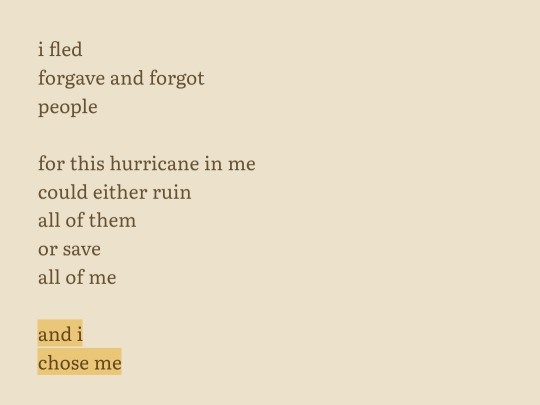
Yesterday I was the Moon by Noor Unnahar
#noor unnahar#yesterday I was the moon#moon#poem#poetry#poet#dark academia#quotes#spilled words#spilled thoughts#dark aesthetic#text#book quotes#words#words words words#dark acadamia aesthetic#annotation#annotations#annotated books#annotating books#annotate#booklr#dark academia aesthetic#academia aesthetic#chaotic academia#classic academia#light academia aesthetic#soft academia#romantic academia#study motivation
6K notes
·
View notes
Text


Tennessee Williams // Marina Tsvetaeva
#writers on tumblr#writerscommunity#writers#dark academia#literature#poetry#quotes#moon poetry#poem#light academia#romance#romantic academia#love quotes#novels#annotation#annotated books#fantasy books#poetry books#memes#i love you#time
3K notes
·
View notes
Photo
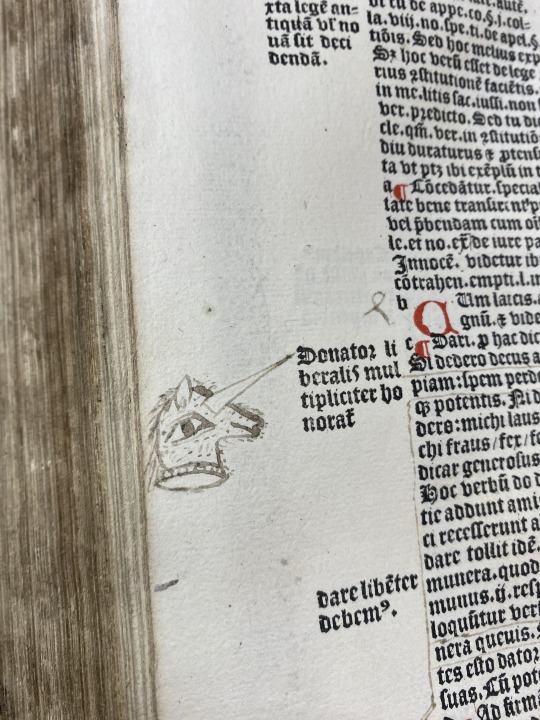
A manicule, but make it a unicorn. A unicornicule?
This wonderful little surprise appeared in the margins of a 1505 book of English canon law.
#unicorn#marginalia#margin mondays#annotation#16th century#English law#legal history#canon law#latin#rare books#old books#riesenfeld center#umn law#university of minnesota#law library
3K notes
·
View notes
Text
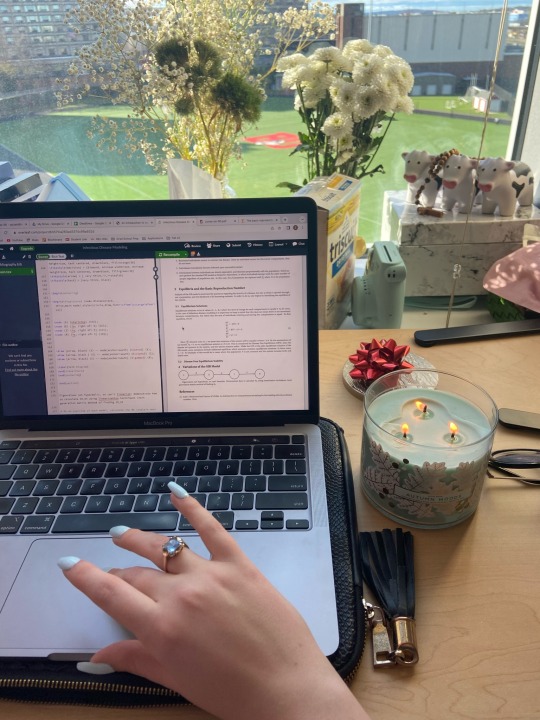
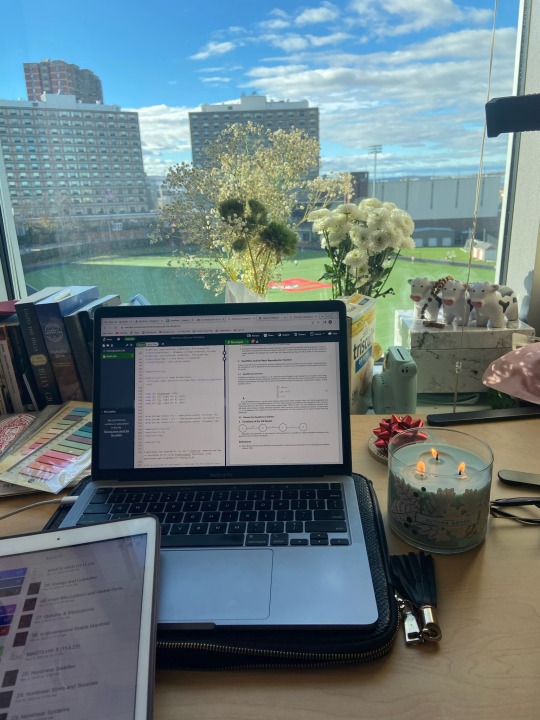
Saturday, November 12
I’ve really started loving saturdays. They’re my most productive day of the week. I spend them cleaning, first and foremost. Today I did laundry, dishes, replaced my bedding, and plan on grocery shopping in a little bit. I also am typing up the research paper I procrastinated, and am genuinely enjoying it, surprisingly. It’s a fascinating subject (mathematical modeling if infectious diseases). My goal is to churn out a few pages of work, then go back to cleaning.
I also let myself sleep in on Saturdays. It’s the one day a week I have nowhere to be, which is nice. And I replace the flowers on my desk, although the bouquet on the left is two weeks old and still blooming, and the one on the right is a week old and fresh, so I may leave them another week before getting a new bouquet. Then again, maybe not. I love fresh flowers.
#studyblr#student#booklover#annotation#college#annotating books#classic literature#study blog#dark academia#studyspo#university#classics
785 notes
·
View notes
Text
How I Annotate Non-Fiction Books:
Step one gathering supplies. The supplies you need will be based on your needs and the text you are annotating so feel free to fit this to your need or habits.
For physical books: highlighters, pens, sticky notes, page flags, index cards, the book/document
For digital books: your device or choice (might do an in depth post of digital texts later)

step two- creating your key
For small documents, I tend to stick to one color (each of my classes are assigned a single color).
For Longer documents, with lots of information, I will create a key for example:
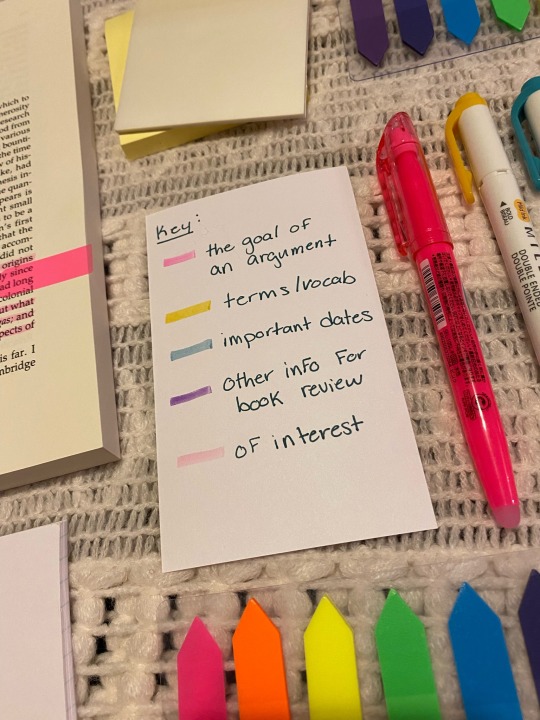
keys should be based on what information is most important. In my history classes dates and names are more important whereas in a science class terms and chemical formulas may be most important.
You should also keep in mind why you are reading the book/document. For example: Are you reading to write a book report? Then it would be best to highlight the thesis and any points you wish to bring up in your review.
some parts of your key will most likely not need writing down after they become habit, for example after highlighting an important term, I will underline the definition of the term. (I personally tend to under highlight)
very important highlighted text will also get a page flag so that it is easier to find when reviewing, write a review, etc.
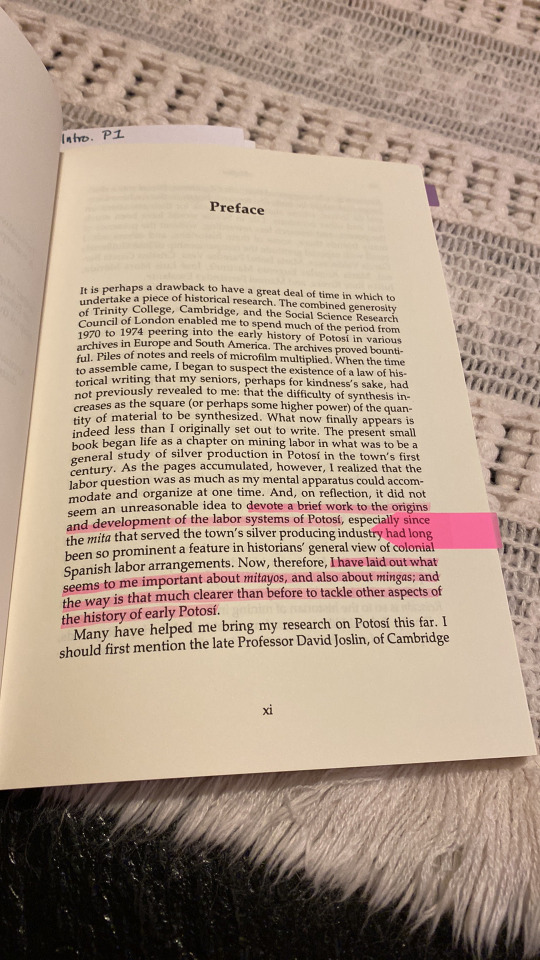
step three- your first read through
break the reading into smaller segments, for example. if you are reading a textbook or information-dense book you may wish to use headings or subheadings as your guide for this. if your text is not already broken into smaller section resign yourself to summarizing after every few paragraphs
You can write your summaries in whatever way suits you, your habits, or the book you are working with.
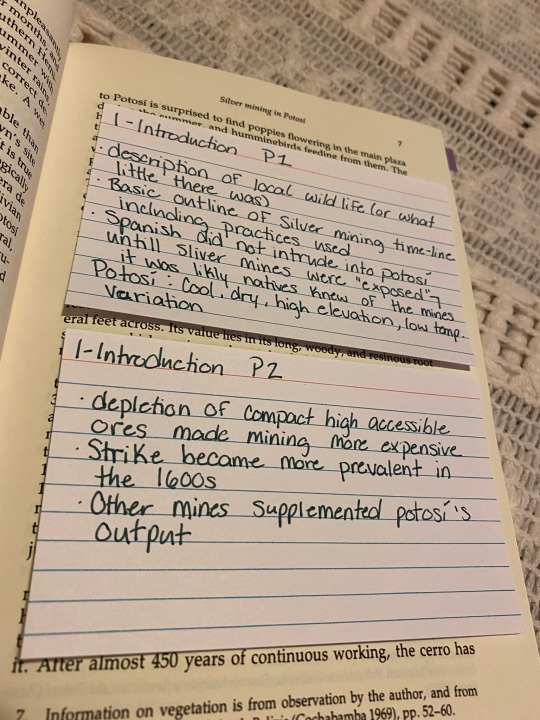
For this book I am writing my summaries in index cards, but I could have written them in sticky notes, or in a notebook (physical or digital.) I have tried all of these techniques and I like them all and tend to switch between them.

On the back of my summary cards, I write the page numbers the information was pulled from so that I can more quickly find the information if I need to quote it.
Feel free to ask questions in the replies or in my asks!
#Rosie teaches#studyblr#study#studying#100 days of productivity#study tips#college#studyspo#study notes#student#new studyblr#text book#annotating#annotation#annotating books#book#new bookblr#english#language#language arts#historyblr#history#study inspiration#study advice#study with Rosie
624 notes
·
View notes
Text
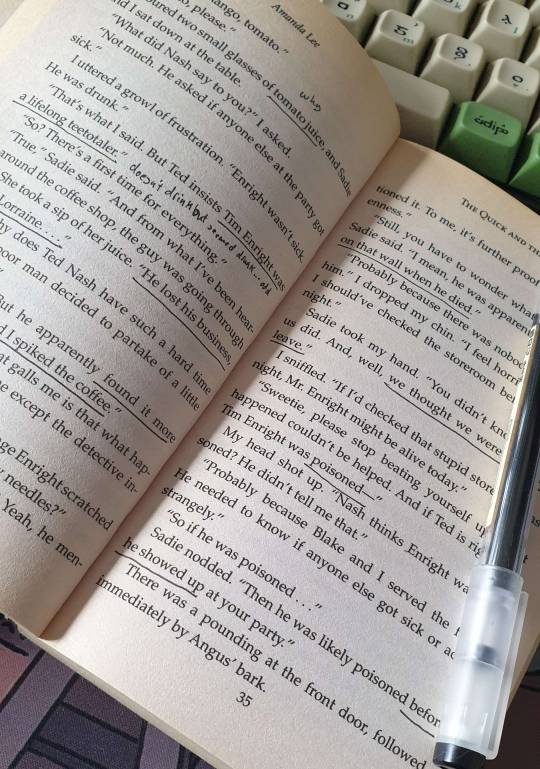
Doing a silly just for fun little read along with my friend, we're reading an embroidery murder mystery book, cosy mystery's aren't typically what I read but as we're both crafters we thought it would be fun. We're reading one chapter at a time and then talking about it on a discord call before we read the next chapter. It's fun and I definitely think we'll be doing this with the whole series, bonus is it's helping get me back into reading.
#my post#studyblr#studyspo#study#iwanttolearnallthethings#book#books#book annotating#annotating#annotation
47 notes
·
View notes
Text
Annotating books is my love language 😩
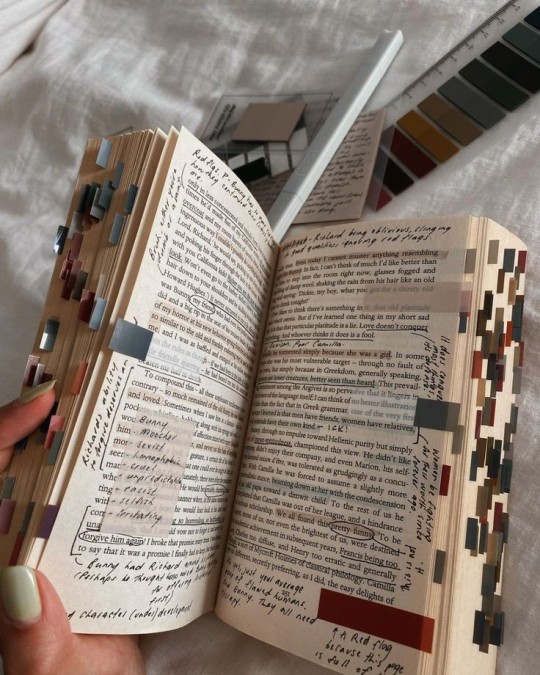
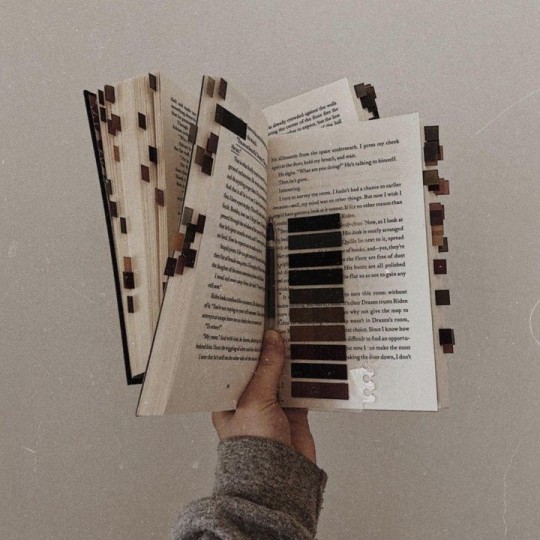
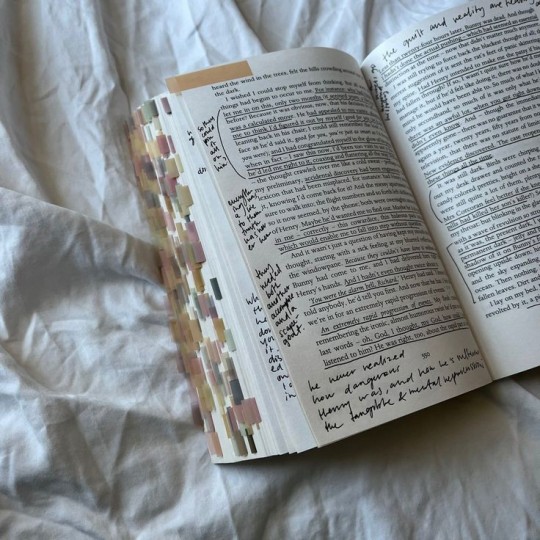
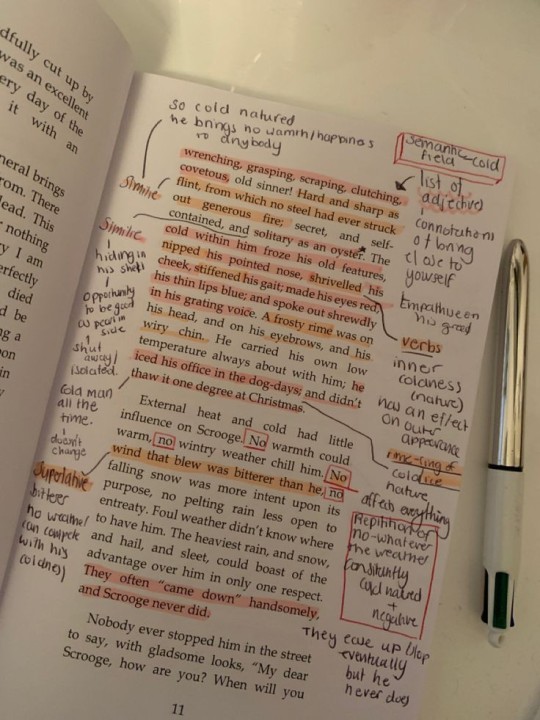
#romantic academia#aesthetic#books to read#anime and manga#bibliophile#classic academia#dark academia#chaotic academia#fantasy books#art academia#book tumblr#books and literature#books & libraries#annotating books#annotation#book review#books and reading#book aesthetic#book blog#bookstagram#book recommendations#book recs#bookaholic#booklover#books and coffee#booknerd#beautiful words#book haul
926 notes
·
View notes
Text
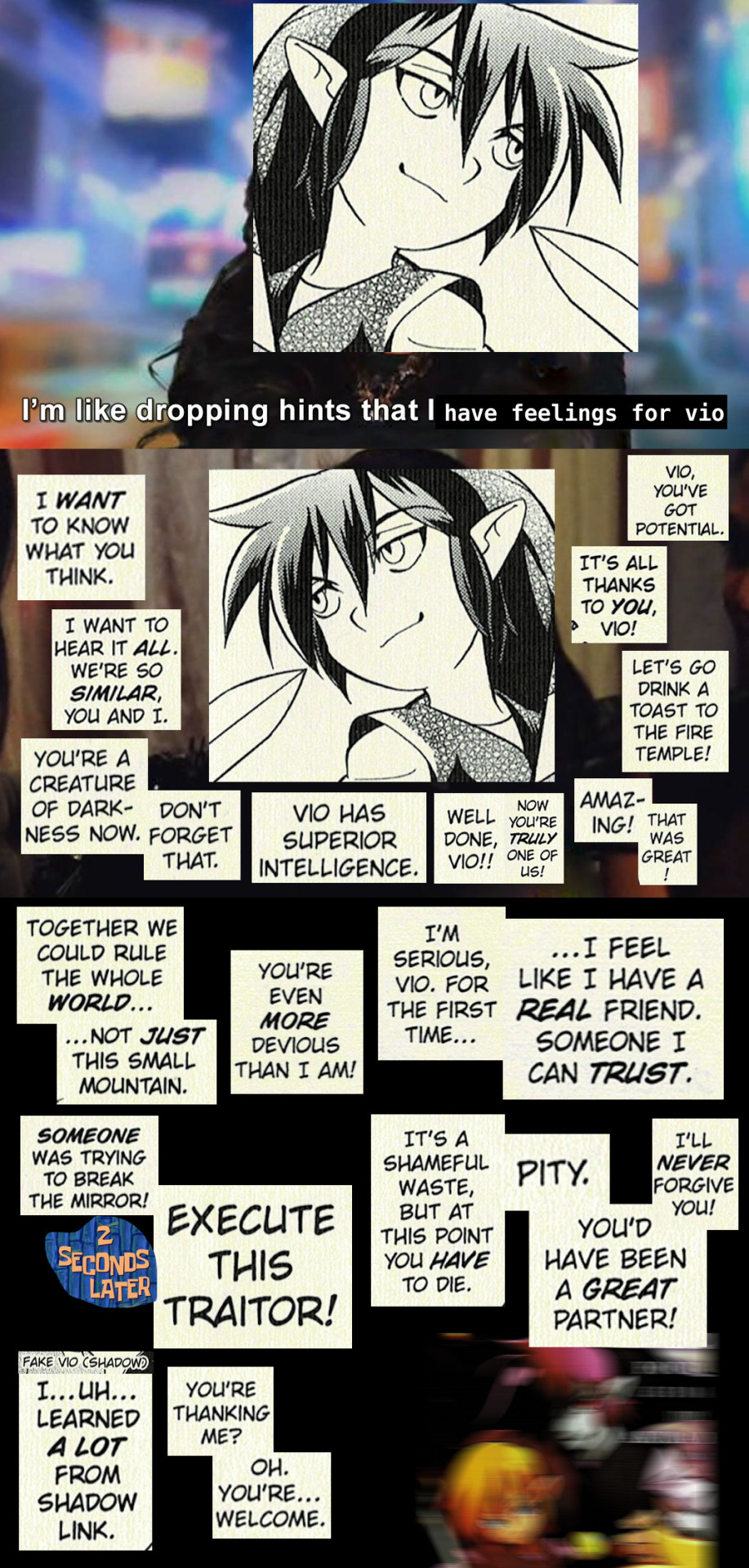
316 notes
·
View notes
Text
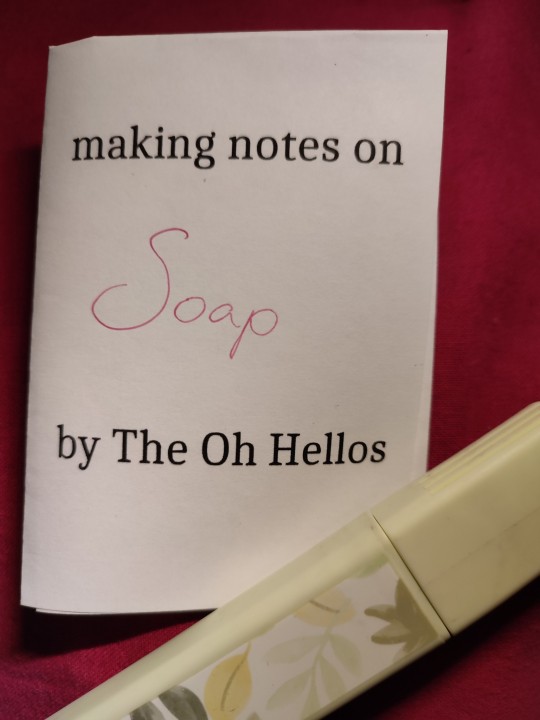


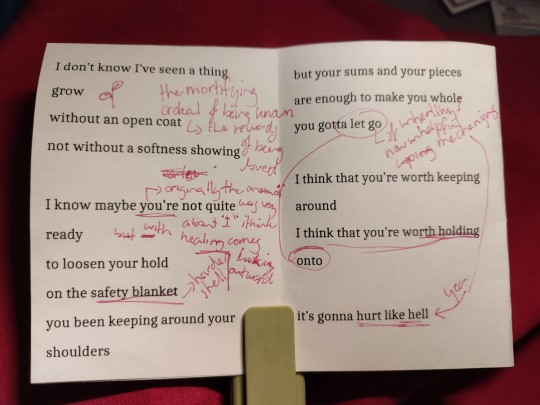
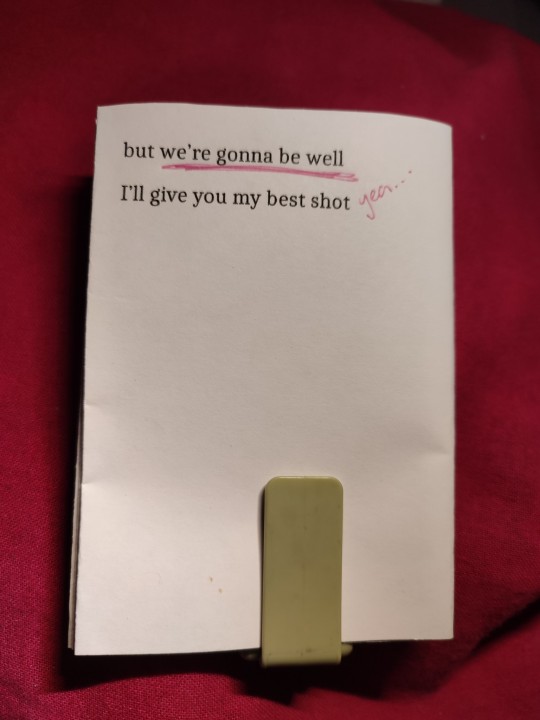
i annotated this song a bit! i was originally wanting to do Old Witch Sleep And Good Man Grace by the Amazing Devil but uh. that song is like 8 minutes and hasn't got that much repeat lyrics so i couldn't possibly fit it in a zine while also keeping room to write. so i picked a shorter song i like the meaning of! i love the anemoi cycle by the oh hellos, i relate to it a lot
no image description because i literally don't know how i'd write all the text down linearly? but especially if you struggle with my handwriting, if you ask i'll transcribe particular bits
i may do more of these (so also if someone has thoughts on a good way to image describe these i'm all ears)
if you don't know the song, here's a youtube link
this is part of my project to make a zine a day in april
#lyrics#the oh hellos#bis arts#zine#handmade zine#my zine#mini zine#1 sheet zine#8 page zine#soap the oh hellos#zephyrus#anemoi cycle#song#song analysis#annotation#undescribed#zinepril#aprine
20 notes
·
View notes
Text
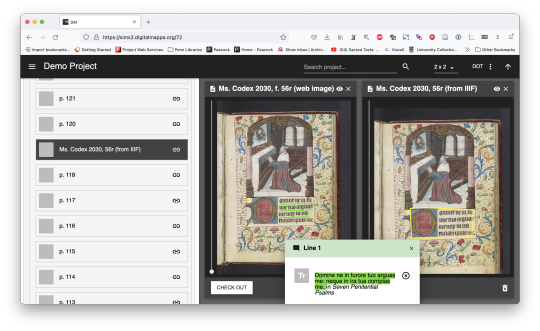
Digital Mappa (DM) is a system for building digital projects, based on highlighting, annotating, and linking together text and image. With an open installation hosted by the Schoenberg Institute for Manuscript Studies at the University of Pennsylvania, DM is free to use. DM is developed by Dr Martin Foys at the University of Wisconsin Madison.
Are you using DM, or are you interested in using it? Are you having questions or issues? Come to our introductory workshop on Tuesday, September 19, at 12pm Noon ET - 1:30pm.
Topics covered will include starting new projects, creating annotations, making and linking highlights, and tips for publishing finished projects. There will also be time for Q&A.
Register here!
#digital mappa#digital tools#editing#annotation#manuscripts#but can be used for other things too#everyone is welcome#zoom#registration required
69 notes
·
View notes
Text
how to start analysing manga, such as BSD
anon asked: Do u have any tips that could help with analysing manga like bsd and such?
yes!
1. it's okay to start with a surface level assumption and then dig deeper. say something like "dazai's costume changed when he joined the ADA" and then ask yourself "why?" and you'll end up falling down a rabbit hole about costume design
2. choose one theme and stick with it. you can always go back later with a different theme, but it's much easier if you're only focusing on a few things at a time.
3. annotate! have a system, and if it makes you happy to make it look aesthetically pleasing, make it aesthetically pleasing!
4. talk to other people. share your ideas and questions and there will always be another person in this fandom who has the same question, or maybe even an answer!
[Smile or comment on the answer here](https://retrospring.net/@bluemoonasks/a/112194601113295482)
16 notes
·
View notes
Text
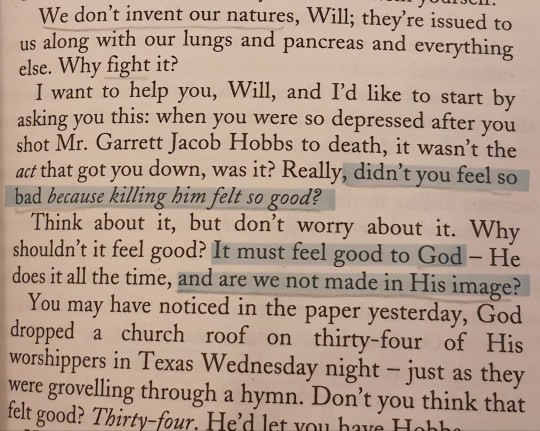
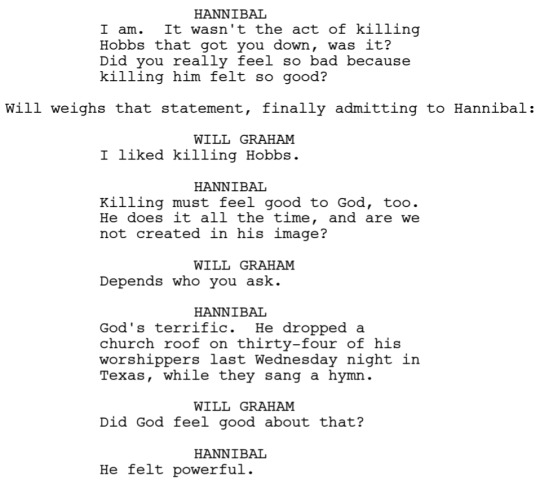
#hannibal#red dragon#silence of the lambs#will graham#poetry#the great red dragon#hannigram#hannibal lecter#thomas harris#annotating books#annotation
224 notes
·
View notes
Text
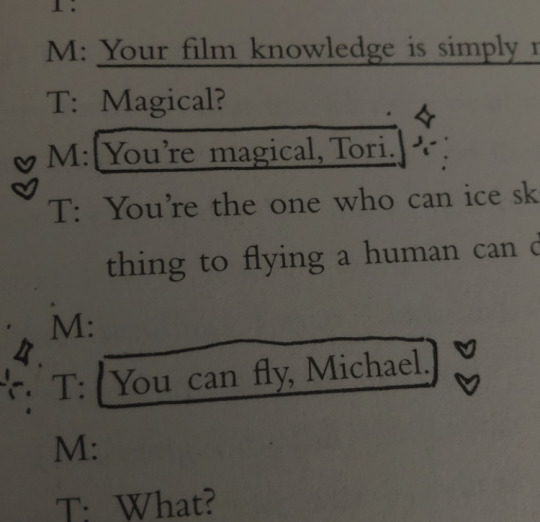
reading this line, absolutely sobbing /j
┊͙✧˖*°࿐ pg.185 // solitaire by alice oseman
#alice oseman#heart stopper#osemanverse#solitaire#solitaire alice oseman#tori spring#michael holden#sprolden#lgbtq#annotation
266 notes
·
View notes
Text
I wanna annotate some of my alice oseman books but Im afraid ill accidently ruin them
#Heartstopper#alice oseman#radio silence#solitaire#iwbft#osemanverse#heartstopper alice oseman#tori spring#nick nelson#charlie spring#Michael Holden#frances janvier#aled last#jimmy kaga ricci#lister bird#annotation#annotating books#ahhhhhhhhh
238 notes
·
View notes
Text
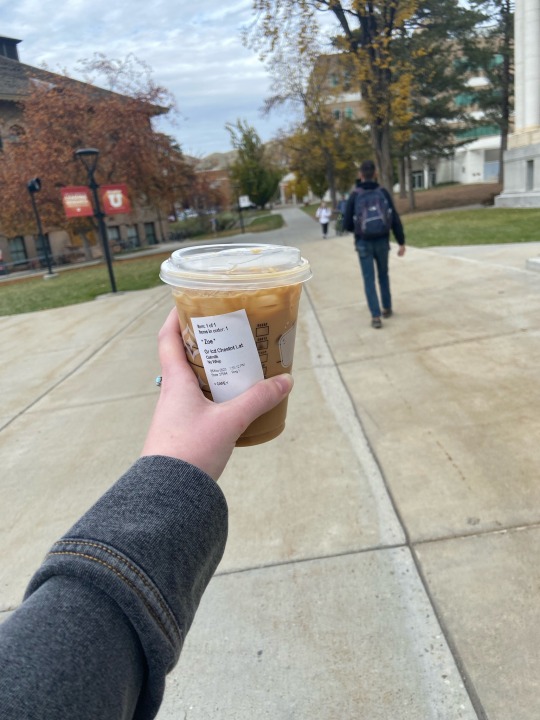
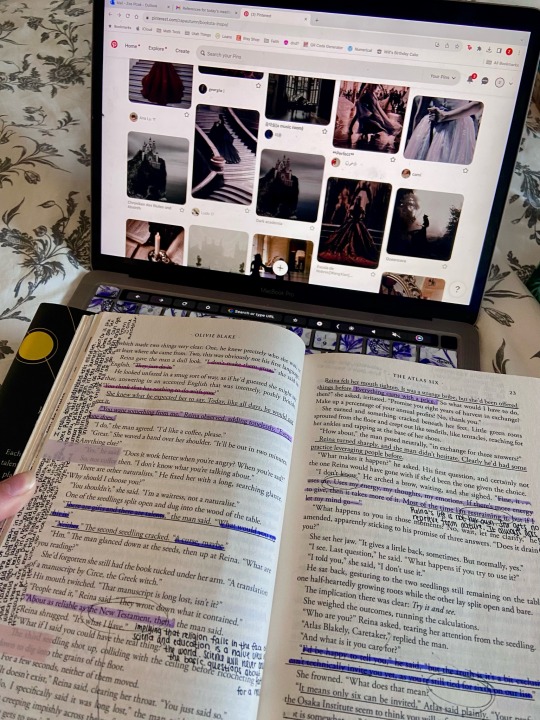

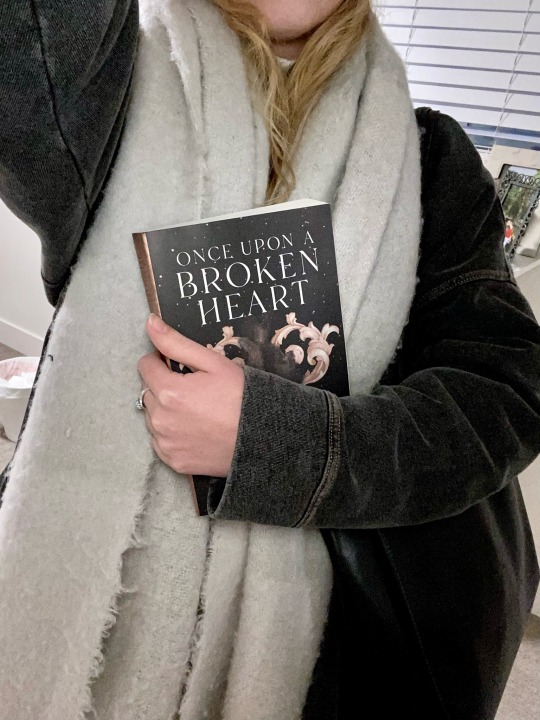
Saturday, November 11th
Mini life photo dump. Classes are busy, problem sets are never ending, math proofs are exhausting. But I just finished the Once Upon a Broken Heart trilogy, made my way into 2 Corinthians in my Bible, got a new Starbucks cup with my rewards points, and checked off a bunch of cleaning chores off my to-do list. Feeling like a real adult this season.
#studyblr#student#college#study blog#annotation#booklover#annotating books#literature#annotated books#classic literature
74 notes
·
View notes
Text
Annotating Fiction Books
Here is a Link to my annotating non-fiction post
Step one for annotating is always knowing your purpose.
For example Someone who is annotating fiction for use in their literature class and someone who is annotating their favorite novel are going to annotate in very different ways.
Your purpose can be as simple as highlighting/tagging quotes that you like or as complex as showcasing evidence for a paper you are writing about the book. Most of my suggestions will be for those annotating for pleasure rather than for class work.
The second step is gathering your supplies.
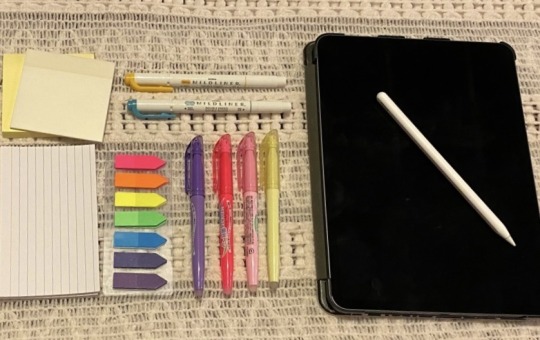
For physical books this can be highlighters, pens, sticky notes, page flags, index cards, the book/Text
For digital books this will include your device of choice (might do an in-depth post of digital texts later)
Depending on how in depth you want to be with your annotating you may wish to create a key, this can be remembered in your head, or written down in the book (or on a sticky note, index card, or reading log). Your key should be based around your purpose (as determined in step 1)
And honestly that’s all there is to it.
Here are some ideas of things to track while reading and things that I do for annotating bellow.
Using highlighters or tags to color code for different types of info (quotes, plot points, bits of the story you want to remember , funny bits, etc.)
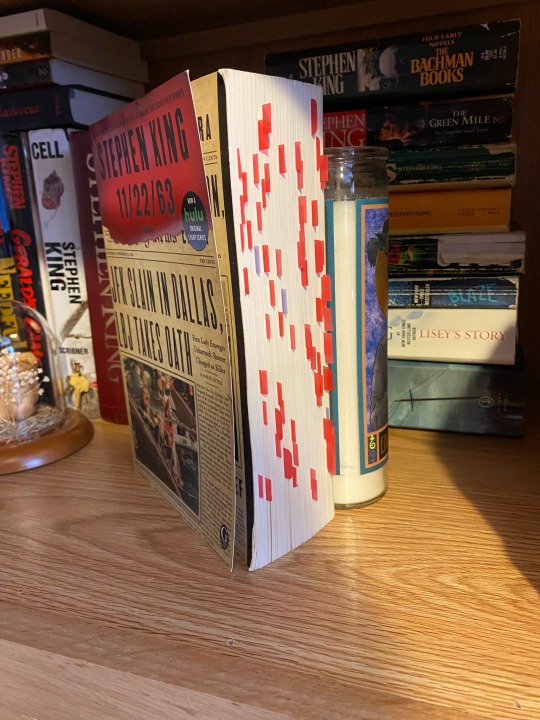
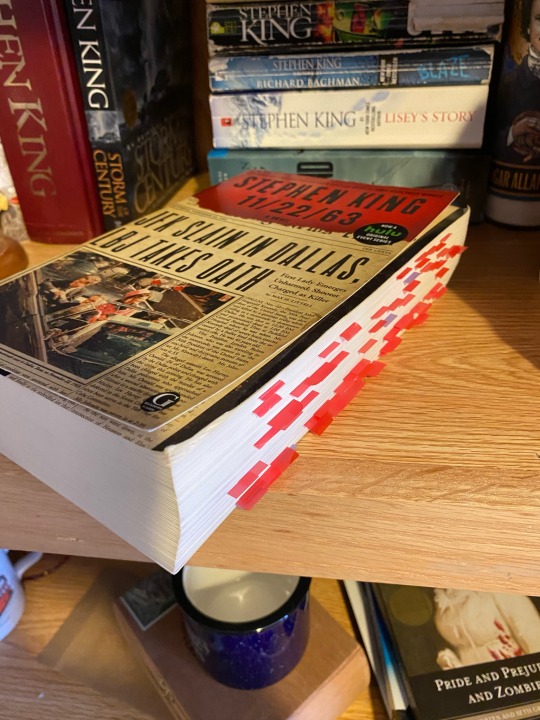
Matching tab/highlighter colors to the books cover
Writing comments around the text (in margins, sticky notes, index cards, reading journal)
Keep track of quotes that inspire you. For me this means highlighting well written lines.
Copying quotes and Writing in a reading log to avoid damaging (borrowed) books (you can also use sticky notes if you like the feeling of writing in books. They also make clear sticky notes so u can highlight or write on top of text without hurting your books)

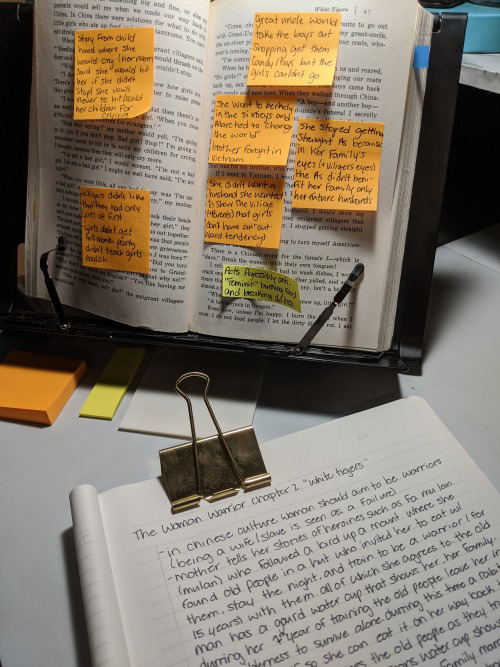
Using highlighters and an index card (or your reading journal) to keep a timeline, track lore, or explore the universe
Use symbols and shorthand to make annotating quicker
And remember you decide what is and isn’t appropriate for your books. You decide what is too much or too little annotating (but also keep future you in mind. don’t make future you distracted by all the annotations on your next reread, if you get distracted by these types of things, I find that if I over annotate it takes me out of the story on future rereads)
#annotation#annotating#annotating books#fiction#fiction books#booklr#bookblr#studyblr#study#studying#study tips#100 days of productivity#college#studyspo#student#study notes#new studyblr#digital note taking
209 notes
·
View notes